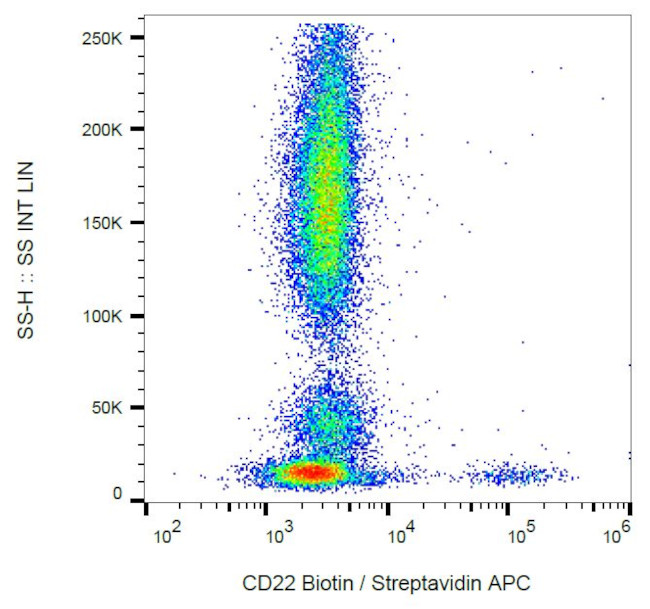Search Thermo Fisher Scientific
Product Details
MA1-19507
Species Reactivity
Host/Isotype
Class
Type
Clone
Immunogen
Conjugate
Form
Concentration
Purification
Storage buffer
Contains
Storage conditions
Shipping conditions
RRID
Product Specific Information
This antibody recognizes uniquely epitope "E"; it does not cross-block antibodies RFB-4, CLB22/1 and CLB-BLy1.
Target Information
CD22 (BL-CAM) is a type 1 integral membrane glycoprotein with molecular weight of 130 to 140 kDa. CD22 is expressed in both the cytoplasm and cell membrane of B-lymphocytes. CD22 antigen appears early in B-cell lymphocyte differentiation at approximately the same stage as the CD19 antigen. Unlike other B-cell markers, CD22 membrane expression is limited to the late differentiation stages comprised between mature B cells (CD22+) and plasma cells (CD22-), and may thus prove useful in phenotyping mature leukemias. CD22 is also strongly expressed in hairy cell leukemia. CD22 preferentially binds to alpha2,6-linked sialic acid. The sialic acid recognition site can be masked by cis interactions with sialic acids on the same cell surface. Upon ligand induced tyrosine phosphorylation in the immune response seems to be involved in regulation of B cell antigen receptor signaling. CD22 plays a role in positive regulation through interaction with Src family tyrosine kinases and may also act as an inhibitory receptor by recruiting cytoplasmic phosphatases via their SH2 domains that block signal transduction through dephosphorylation of signaling molecules. CD22 is also strongly expressed in hairy cell leukemia. CD22 is also positive in diffuse large B-cell lymphoma and nodular lymphocyte predominance Hodgkin’s lymphoma, but negative in classical Hodgkin’s lymphoma.
For Research Use Only. Not for use in diagnostic procedures. Not for resale without express authorization.
References (0)
Bioinformatics
Protein Aliases: B-cell receptor CD22; B-lymphocyte cell adhesion molecule; B-lymphocyte cell adhesion molecule (BL-CAM); BL-CAM; CD22; CD22 antigen; FLJ22814; Lectin 2; Leu-14; MGC130020; sialic acid binding Ig-like lectin 2; Sialic acid-binding Ig-like lectin 2; Sialic acid-binding Ig-like lectin 2 (Siglec-2); Siglec-2; T-cell surface antigen Leu-14
Gene Aliases: CD22; SIGLEC-2; SIGLEC2
UniProt ID: (Human) P20273
Entrez Gene ID: (Human) 933

Performance Guarantee
If an Invitrogen™ antibody doesn't perform as described on our website or datasheet,we'll replace the product at no cost to you, or provide you with a credit for a future purchase.*
Learn more
We're here to help
Get expert recommendations for common problems or connect directly with an on staff expert for technical assistance related to applications, equipment and general product use.
Contact tech support

